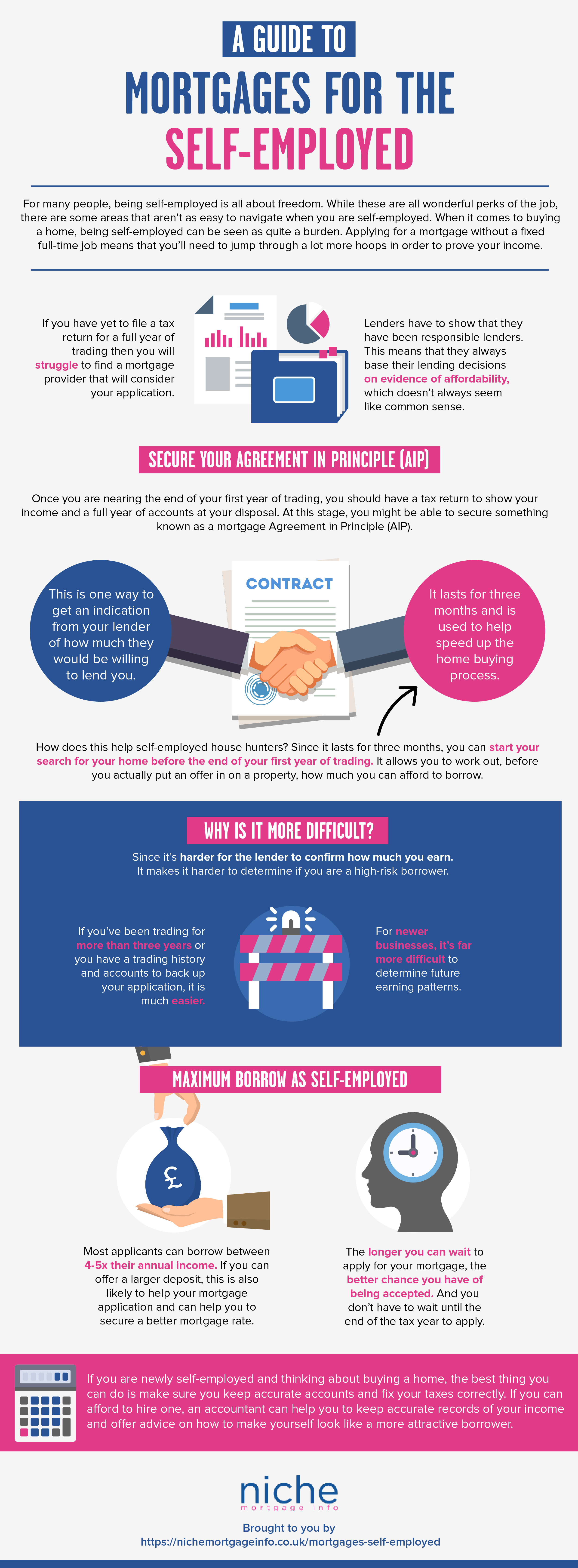

For many people, being self-employed is all about freedom. You have the freedom to choose your working hours. You have the freedom to work from home, a coffee shop, or to rent your own office space. While these are all wonderful perks of the job, there are some areas that aren’t as easy to navigate when you are self-employed.
When it comes to buying a home, being self-employed can be seen as quite a burden. Applying for a mortgage without a fixed full-time job means that you’ll need to jump through a lot more hoops in order to prove your income. However, if your business is quite new, then this can get even more complicated. Mortgage providers often want to look over your books. So if you don’t have at least two year’s of accounts, it can be difficult to prove your income.
Remember that mortgage providers want to see that you’ll be able to afford to keep up with payments. For the self-employed, this means that they are going to want to see that your business has a track record of success and that you will have the means to continue to support yourself in future.
Some companies out there will offer a business loan which can be used specifically for a mortgage. While this is a possible route, you will need to consider if you want to entwine your home with your business. The loan will often be more expensive than a traditional mortgage and the provider will often want to see a substantial amount of collateral, usually your property.

If you have yet to file a tax return for a full year of trading then you will struggle to find a mortgage provider that will consider your application. Lenders have to show that they have been responsible lenders. This means that they always base their lending decisions on evidence of affordability, which doesn’t always seem like common sense.
Without evidence of your income in an official document, such as a tax return, it can be difficult to prove that you have regular and reliable income. Your business might be reliant on income from just other company or client, which puts your business at risk. Your business might be seasonal, and the first six months of trading might look more favourable than the next six months. These are all things that lenders need to consider, so the more evidence you can give them, the better.
Once you are nearing the end of your first year of trading, you should have a tax return to show your income and a full year of accounts at your disposal. At this stage, you might be able to secure something known as a mortgage Agreement in Principle (AIP). This is one way to get an indication from your lender of how much they would be willing to lend you. It lasts for three months and is used to help speed up the home buying process. It allows house hunters to start their search with a budget in mind. Once they have chosen their property, they can then make the final mortgage application.
How does this help self-employed house hunters? Since it lasts for three months, you can start your search for your home before the end of your first year of trading. It allows you to work out, before you actually put an offer in on a property, how much you can afford to borrow.

Since it’s harder for the lender to confirm how much you earn. It makes it harder to determine if you are a high-risk borrower. If you’ve been trading for more than three years. Or you have a trading history and accounts to back up your application. For newer businesses, it’s far more difficult to determine future earning patterns.

Self-certified mortgages are now a thing of the past. Since the recessions and the Mortgage Market Review, these have been phased out as they were prone to abuse. The self-cert mortgage allowed borrowers to tell the lenders what they were earning without providing any proof. This allowed people to inflate their incomes in order to be able to buy a bigger property.

Once you can prove your income and the lenders are satisfied with the evidence provided, you will often be treated like any other applicant. Most applicants can borrow between 4-5x their annual income. If you can offer a larger deposit, this is also likely to help your mortgage application and can help you to secure a better mortgage rate. Even though you might feel like your application if more difficult, you should still shop around for the best deal.
The longer you can wait to apply for your mortgage, the better chance you have of being accepted. And you don’t have to wait until the end of the tax year to apply. For example, if you’ve been trading for 21 months, you’ll have a full year of income plus 10 months of your second year. Lenders will be able to use your past trading history to project your income for the remaining few months of the year.
If you are newly self-employed and thinking about buying a home, the best thing you can do is make sure you keep accurate accounts and fix your taxes correctly. If you can afford to hire one, an accountant can help you to keep accurate records of your income and offer advice on how to make yourself look like a more attractive borrower. However, you don’t need to employ an expert to be able to get a mortgage while self-employed. You can increase your chances of being accepted if you are applying with a partner who is employed full-time.
